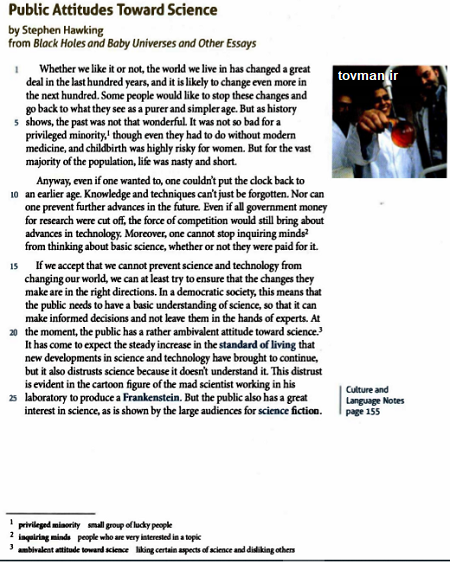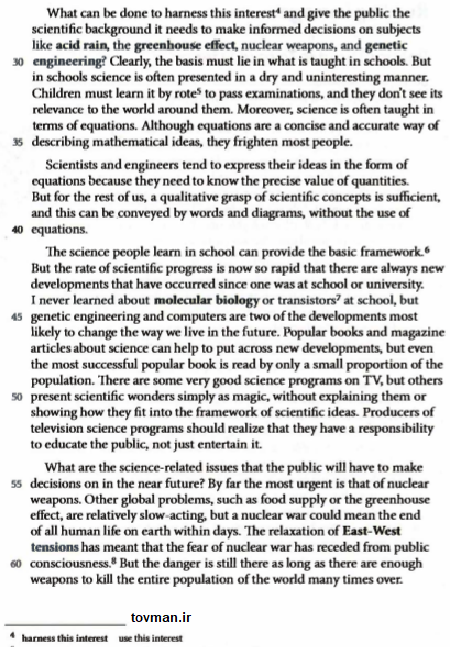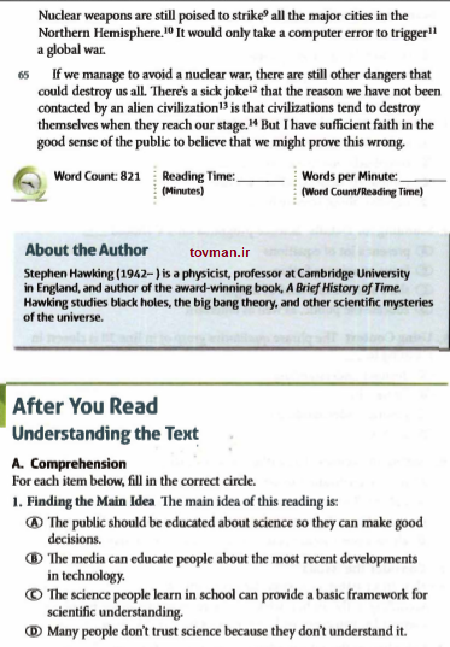
Public Attitudes Toward Science
نگرش مردم به علم
by Stephen Hawking نوشته شده توسط استیفن هاوکینگ
from Black Holes and Baby Universes and Other Essays از دانشگاه بابی و بلک هول و دیگر مقالات



Whether we like it or not, the world we live in has changed a great deal in the last hundred years, and it is likely to change even more in the next hundred. Some people would like to stop these changes and go back to what they see as a purer and simpler age. But as history shows, the past was not that wonderful. It was not so bad for a privileged minority, ۱ though even they had to do without modern medicine, and childbirth was highly risky for women. But for the vast majority of the population, life was nasty and short
چه دوست داشته باشیم یا نداشته باشیم دنیایی که ما در آن زندگی می کنیم در صد سال اخیر تغییرات زیادی کرده است و احتمالاً در صد سال آینده بیشتر تغییر خواهد کرد. بعض از مردم می خواهند این تغییرات را متوقف کنند و به آنچه که در سنین کوچکتر و پاکتر دیده اند برگردند. . اما همانطور که تاریخ نشان می دهد گذشته چندان حیرت آور نبود. آن برای گروه اقلیت ممتاز بعد نبود اگرچه حتی آنها مجبور بودند بدون دارو های مدرن این کار را انجام دهند و زایمان برای زنان خطرات زیادی داشت. اما برای اکثریت مردم، زندگی نامطبوع و کوتاه بود.
Anyway, even if one wanted to, one couldn't put the clock back to an earlier age. Knowledge and techniques can't just be forgotten. Nor can one prevent further advances in the future. Even if all government money for research were cut off, the force of competition would still bring about advances in technology. Moreover, one cannot stop inquiring minds۲ from thinking about basic science, whether or not they were paid for it
به هر حال حتی اگر کسی بخواهد هم نمی تواند ساعت را به دوران قبل برگرداند. دانش و فناوری نمی تواند فراموش شود. کسی نمی تواند مانع پیشرفت های بعدی در آینده شود. حتی اگر تمامی پول دولت برای تحقیقات قطع شود، قدرت رقابت هنوز پیشرفت هایی در فناوری را به همراه خواهد داشت. علاوه بر این، کسی نمی تواند ذهن پژوهنده را از تفکر درباره علوم پایه باز دارد، خواه ناخواه آنها بدان می پردازند.
If we accept that we cannot prevent science and technology from changing our world, we can at least try to ensure that the changes they make are in the right directions. In a democratic society, this means that the public needs to have a basic understanding of science, so that it can make informed decisions and not leave them in the hands of experts. At It has come to expect the steady increase in the standard of living that new developments in science and technology have brought to continue, but it also distrusts science because it doesn't understand it. This distrust is evident in the cartoon figure of the mad scientist working in his laboratory to produce a Frankenstein. But the public also has a great interest in science, as is shown by the large audiences for science fiction
اگر بپذیریم که ما نمی توانیم مانع علوم و فناوری از تغییر دنیای خود شویم، حداقل می توانیم مطمئن شویم تغییراتی که آنها ایجاد می کنند در مسیر صحیح است. در جوامع دموکراتیک، این به معنای آن است که مردم باید درک اساسی از علوم داشته باشند تا بتوانند تصمیمات آگاهانه ای اتخاذ کنند و آنها را در دست متخصص نگذارند. انتظار می رد که این پیشرفت های جدید فناوری، افزایش بیشتر استانداردهای زندگی را در پی داشته باشد، اما همچنان به علوم بی اعتماد است زیرا آن را نمی فهمد. این بی اعتمادی در شخصیت کارتونی دانشمند دیوانه ای که در آزمایشگاه خود یک فرانکشتاین تولید می کند مشهود است. علاقه مخاطبان بسیاری به داستان های علمی نشان می دهد که مردم همچنان به علم علاقه مندند.
What can be done to harness this interest and give the public the scientific background it needs to make informed decisions on subjects like acid rain, the greenhouse effect, nuclear weapons, and genetic engineering? Clearly, the basis must lie in what is taught in schools. But in schools science is often presented in a dry and uninteresting manner. Children must learn it by rote to pass examinations, and they don't see its relevance to the world around them. Moreover, science is often taught in terms of equations. Although equations are a concise and accurate way of describing mathematical ideas, they frighten most people
برای مهار این علاقه و دادن پیش زمینه عملی مورد نیاز برای گرفتن تصمیمات آگاهانه در مورد باران اسیدی، اثرات گلخانه ای، سلاحهای اتمی و مهندسی ژنتیک چیکار می توان کرد؟ بدیهی است که اساس باید در آنچه در مدرسه آموزش داده می شود، قرار گیرد. اما در مدرسه علوم اغلب به روشی خشک و کسل کننده ارائه می شود. کودکان باید با تکرار مداوم و امتحان دادن یاد بگیرند و ارتباط آنها را با جهان پیرامون خود نمی بینند. علاوه بر این، علم اغلب با اصطلاح معادلات تدریس می شود. اگرچه معادلات روشی مختصر و دقیق برای توصیف ایده های ریاضی هستند ، اما بیشتر افراد را می ترسانند.
Scientists and engineers tend to express their ideas in the form of equations because they need to know the precise value of quantities. But for the rest of us, a qualitative grasp of scientific concepts is sufficient, and this can be .conveyed by words and diagrams, without the use of equations
دانشمندان و مهندسان تمایل دارند ایده های خود را در قالب معادلات بیان کنند زیرا باید مقدار دقیق مقادیر را بدانند. اما برای بقیه ما ، درک کیفی مفاهیم علمی کافی است ، و این می تواند توسط کلمات و نمودارها و بدون استفاده از معادلات منتقل شود
The science people learn in school can provide the basic framework. ۶ But the rate of scientific progress is now so rapid that there are always new developments that have occurred since one was at school or university. I never learned about molecular biology or transistors at school, but genetic engineering and computers are two of the developments most likely to change the way we live in the future. Popular books and magazine articles about science can help to put across new developments, but even the most successful popular book is read by only a small proportion of the population. There are some very good science programs on TV, but others
present scientific wonders simply as magic, without explaining them or showing how they fit into the framework of scientific ideas. Producers of television science programs should realize that they have a responsibility to educate the public, not just entertain it
علمی که مردم در مدرسه می آموزند، چارچوب اساسی را فراهم می آورد. اما سرعت پیشرفت علمی امروزه به قدری سریع است که همیشه پیشرفت های جدیدی در علم رخ می دهد که قبلاً در مدرسه یا دانشگاه نبوده است. من هرگز در مدرسه در مورد زیست شناسی سلولی یا ترانزیستورها یاد نگرفته ام، اما مهندسی ژنتیک و کامپیوتر دو پیشرفتی هستند که احتمالاً بیشترین تغییر را ددر روشی که ما حالا و در آینده زندگی می کنیم، ایجاد می کنند. کتب و مقالات مجلات مشهور می توانند به تحولات جدید کمک کنند، اما حتی موفق ترین و محبوب ترین کتاب تنها بوسیله گروه کوچکی از مردم مطالعه می شود. برنامه های علمی خیلی خوبی در تلوزیون وجود دارد اما دیگران شگفتی های علمی به سادگی همانند جادو نشان می دهند بدون اینکه آنها را توضیح دهند یا نشان دهند چگونه آنها در قالب نظرات علمی قرار می گیرند. تولید کننده های برنامه های علمی تلوزیون باید بدانند که آنها مسئول آموزش مردم هستند نه فقط سرگرم کردن آنها.
what are the science-related issues that the public will have to make decisions on in the near future? By far the most urgent is that of nuclear weapons. Other global problems, such as food supply or the greenhouse effect, are relatively slow-acting, but a nuclear war could mean the end of all human life on earth within days. The relaxation of East-West tensions has meant that the fear of nuclear war has receded from public consciousness. ۸ But the danger is still there as long as there are enough weapons to kill the entire population of the world many times over. Nuclear weapons are still poised to strike۹ all the major cities in the Northern Hemisphere.۱۰ It would only take a computer error to trigger۱۱ a global war.
موضوعات مرتبط با علم که مردم باید در آینده نزدیک درباره آنها تصمیم بگیرند، کدامند؟ تاکنون مهمترین مسئله تسلیحات هسته ای است. دیگر مشکلات جهانی ازجمله تهیه غذا یا اثر گلخانه ای نسبتاً کند عمل می کنند اما یک جنگ هسته ای به معنای پایان زندگی بشریت بر روی کره زمین ظرف چند روز است. کاهش تنش های شرق و غرب به این معنی است که ترس از جنگ هسته ای فکر روزمره مردم نیست اما خطر هنوز وجود دارد تا وقتیکه سلاح کافی برای چندبار کشتن تمام مردم زمین هست، خطر هنوز وجود دارد. تسلیحات هسته ای هنوز آماده برای حمله به همه شهرهای اصلی نیمکره شمالی هستند. تنها یک خطای کامپیوتری شروع یک جنگ جهانی خواهد بود.
If we manage to avoid a nuclear war, there are still other dangers that could destroy us all. There's a sick joke۱۲ that the reason we have not been contacted by an alien civilization ۱۳ is that civilizations tend to destroy themselves when they reach our stage.۱۴ But I have sufficient faith in the good sense of the public to believe that we might prove this wrong
اگر ما مدیریت کنیم تا از یک جنگ هسته اجتناب شود، هنوز خطرات دیگری وجود دارد که می تواند همه ما را از میان بر دارد. دلیل اینکه ما نمی توانیم با تمدنی بیگانه ارتباط برقرار کنیم این است که تمدن ها تمایل به ویران کردن هم دارند وقتی که آنها به مرحله ما می رسند و این طنز تلخی است. اما من ایمان کافی به حس خوب عمومی برای این باور دارم که ما ممکن اس بتوانیم این اشتباه را ثابت کنیم.

